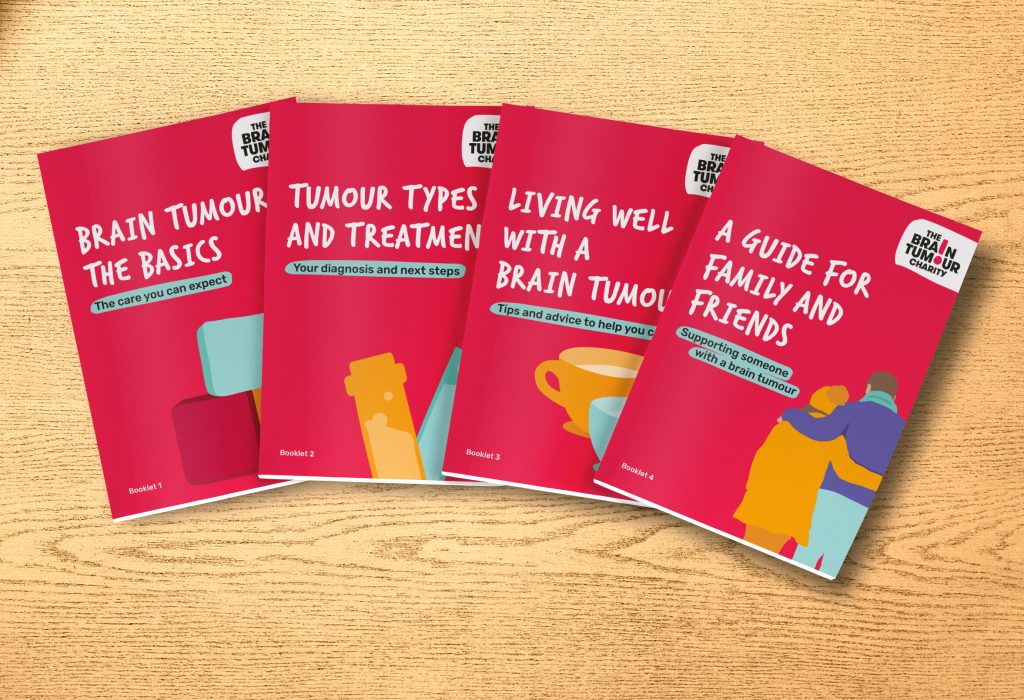CNS lymphoma
CNS lymphoma is a type of tumour that starts in the central nervous system (CNS). These tumours are usually high grade and represent around 3% of brain tumours. A common treatment for CNS lymphomas is chemotherapy and steroids.
On this page, we’ll cover:
- What is a CNS lymphoma?
- CNS lymphoma grade
- CNS lymphoma causes
- CNS lymphoma symptoms
- Treatments for CNS lymphoma
- CNS lymphoma survival rate
Get support
It’s normal to feel shocked if you or someone you know has been diagnosed with a brain tumour. Our Support Team can answer questions you have or provide a listening ear if you need one.
Get your free Information Pack
Our Brain Tumour Information Pack can help you better understand your diagnosis and feel confident talking to your medical team.
Talking to your doctor
Learn more about how to approach your GP.
What is a CNS lymphoma?
Lymphoma is a term for cancers caused by the uncontrolled growth of white blood cells. The lymph system is composed of the tissues and organs that produce, store and carry white blood cells, and its main function is to fight infections.
There are many types of lymphoma. Usually they form in the lymph nodes around the body.
But, rarely, a lymphoma can form in other places, such as the central nervous system (CNS), which is made up of the brain and spinal cord.
A CNS lymphoma can either grow as a mass inside the brain or spinal cord, or it could press on these from nearby. It could form as a tumour that presses on the brain or spinal cord from outside.
Less commonly, CNS lymphoma can affect the meninges. These are the membranes that cover the brain. It might even affect parts of the eyes.
CNS lymphoma represents around 3% of brain and spinal cord tumours. These tumours can occur in children, adolescents and adults, but are more common in people between the ages of 40 and 70.
These lymphomas are called primary central nervous system (CNS) lymphomas. This means that they begin in the central nervous system instead of spreading there from somewhere else.
CNS lymphoma grade
CNS lymphomas are usually high grade and most commonly called ‘diffuse large B-cell of the central nervous system’. A B-cell is a subclass of white blood cells, which are part of the immune system.
Very rarely, B-cell lymphomas of the CNS can be low-grade or spread to the brain from somewhere else in the body.
It’s important for your doctors to find out which type of lymphoma you have. This is because the treatment will differ depending on the type.
CNS lymphoma causes
As with most brain tumours, the causes of CNS lymphoma are not entirely known. But, people with immune system deficiencies are more likely to develop this type of tumour.
So, some risk factors are:
- Having a weakened immune system, which can be caused by HIV.
- Taking immunosuppressants, which are drugs that are often given after an organ transplant.
But, while these are risk factors, most people who develop these tumours don’t have immune system problems.
It’s important to know that there’s nothing you could have done or avoided doing that would have affected whether you developed a CNS lymphoma.
CNS lymphoma symptoms
The CNS lymphoma symptoms might be different depending on where the tumour is located in the central nervous system and how fast it grows.
That being said, CNS lymphoma symptoms could be:
- Nausea or vomiting
- Cognitive difficulties, like slowing of thoughts
- Motion problems or weakness and numbness in one side of the body
- Difficulty speaking
- Vision problems, like blurred vision or blind spots
- Balance issues
- Personality changes, like a change in behaviour
- Headaches
- Seizures (fits)
You can learn more about brain tumour symptoms here.
Treatments for CNS lymphoma
Primary CNS lymphomas are treated differently to other brain tumours in that the main treatment is usually chemotherapy and steroids.
Some people may also have radiotherapy after the chemotherapy.
Your doctor should discuss with you the best treatment options for your diagnosis as well as their possible side effects.
We understand that prognosis can be difficult to read about. So, when you are ready, you can learn about the CNS lymphoma survival rate by clicking the drop-down below.
-
The CNS lymphoma survival rate is unfortunately quite low. Depending on the affected person’s health as well as the tumour location and growth, prognosis can be very different from person to person.
There aren’t any UK statistics for the CNS lymphoma survival rate. But, we do have statistics for the USA. It’s important to understand , though, that these don’t represent the UK because of our different healthcare systems, population, and systems for collecting data.
With that in mind, the CNS survival rate is:
- Approximately 40% of people with CNS lymphoma live for 5+ years after diagnosis
- Approximately 30% of people with CNS lymphoma live for 10+ years after diagnosis
These are given in 5 and 10 year intervals because this is what doctors and specialists use to measure survival rates. They are not meant to show a limit. For example, someone who is a 5 year survivor could live as long as any other healthy person.
If you have any questions or would like to talk to someone about this, please get in touch with our kind and approachable Support Team.
Support and Information Services
Research & Clinical Trials Information
You can also join our active online community.
In this section

Get support
If you need someone to talk to or advice on where to get help, our Support and Information team is available by phone, email or live-chat.
Recommended reading
Share your experiences and help create change
By taking part in our Improving Brain Tumour Care surveys and sharing your experiences, you can help us improve treatment and care for everyone affected by a brain tumour.
